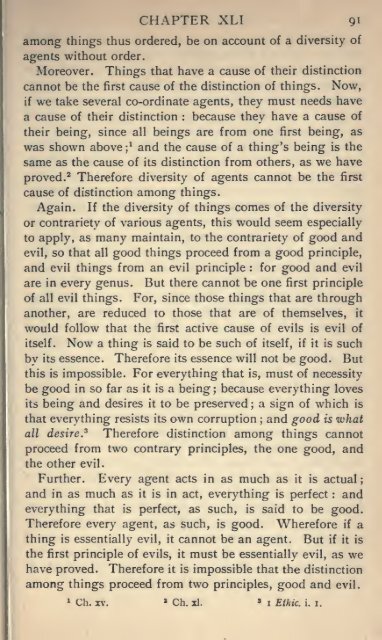summa-contra-gentiles
Summa
Summa
Create successful ePaper yourself
Turn your PDF publications into a flip-book with our unique Google optimized e-Paper software.
CHAPTER XLI 91<br />
among things thus ordered, be on account of a diversity of<br />
agents without order.<br />
Moreover. Things that have a cause of their distinction<br />
cannot be the first cause of the distinction of things. Now,<br />
if we take several co-ordinate agents, they must needs have<br />
a cause of their distinction :<br />
because they have a cause of<br />
their being, since all beings are from one first being, as<br />
was shown above ;^ and the cause of a thing's being is the<br />
same as the cause of its distinction from others, as we have<br />
proved.^ Therefore diversity of agents cannot be the first<br />
cause of distinction among things.<br />
Again.<br />
If the diversity of things comes of the diversity<br />
or <strong>contra</strong>riety of various agents, this would seem especially<br />
to apply, as many maintain, to the <strong>contra</strong>riety of good and<br />
evil, so that all<br />
good things proceed from a good principle,<br />
and evil things from an evil principle : for good and evil<br />
are in every genus. But there cannot be one first principle<br />
of all evil things. For, since those things that are through<br />
another, are reduced to those that are of themselves, it<br />
would follow that the first active cause of evils is evil of<br />
itself. Now a thing<br />
is said to be such of itself, if it is such<br />
by its essence. Therefore its essence will not be good. But<br />
this is impossible. For everything that is, must of necessity<br />
be good in so far as it is a being ; because everything loves<br />
its<br />
being and desires it to be preserved ; a sign of which is<br />
that everything resists its own corruption and good<br />
is ivhat<br />
;<br />
all desire.^ Therefore distinction among things cannot<br />
proceed from two <strong>contra</strong>ry principles, the one good, and<br />
the other evil.<br />
Further. Every agent acts in as much as it is actual ;<br />
and in as much as it is in act, everything is perfect : and<br />
everything that is perfect, as such, is said to be good.<br />
Therefore every agent, as such, is good. Wherefore if a<br />
thing is essentially evil, it cannot be an agent. But if it is<br />
the first principle of evils, it must be essentially evil, as we<br />
have proved. Therefore it is<br />
impossible that the distinction<br />
among things proceed from two principles, good and evil.<br />
1 Ch. XV.<br />
« Ch. xl.<br />
» I Ethic, i. i.


















